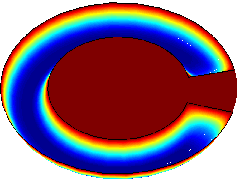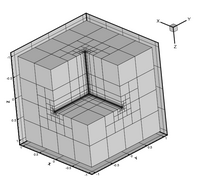You are here: Concepts>Concepts Web>WebHome (13 Sep 2023, KerstenSchmidt)Edit Attach
Numerical C++ Library Concepts
In the numerical C++ library Concepts various finite element methods are implemented in common object oriented framework, which is modular and flexible. This includes- high order nodal finite element methods on quadrilateral meshes in 2D and hexahedral meshes in 3D (with adaptive refinement and varying and anisotropic polynomials degrees),
- high order edge element methods on quadrilateral meshes in 2D (with adaptive refinement and varying and anisotropic polynomials degrees),
- formulations with boundary and transmission conditions using trace spaces (in 2D),
- mixed, hybridized and mortar finite element methods,
- generalized finite element methods,
- fast boundary element methods of lowest orders on triangular meshes in 3D with panel clustering,
- discontinous Galerkin finite element methods.
 |
 |
Starting with Concepts
- Installation - How to download the developing version of Concepts and how to install it.
- How to get started - With this easy example you will find it straightforward to get started with Concepts.
- Tutorials - A collection of tutorials explaining mesh definition/import, parameter input, data in- and output, linear solvers, graphical output etc.
- Applications - A list of applications and their implementation in Concepts.
Class documentation
- Doxygen class documenation - A documentation of namespaces and classes generated using Doxygen.
Edit | Attach | Print version | History: r6 < r5 < r4 < r3 | Backlinks | View wiki text | Edit wiki text | More topic actions
Topic revision: r6 - 13 Sep 2023, KerstenSchmidt
Ideas, requests, problems regarding Concepts? Send feedback
